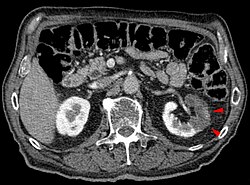Renal infarction

Editor-In-Chief: Prab R Tumpati, MD
Obesity, Sleep & Internal medicine
Founder, WikiMD Wellnesspedia &
W8MD's medical weight loss NYC, sleep center NYC
Philadelphia medical weight loss and Philadelphia sleep clinics
| Renal infarction | |
|---|---|

| |
| Synonyms | Kidney infarction |
| Pronounce | N/A |
| Specialty | N/A |
| Symptoms | Flank pain, hematuria, nausea, vomiting, fever |
| Complications | Renal failure, hypertension |
| Onset | Sudden |
| Duration | Variable |
| Types | N/A |
| Causes | Embolism, thrombosis, trauma |
| Risks | Atrial fibrillation, atherosclerosis, hypercoagulable state |
| Diagnosis | CT scan, MRI, ultrasound, blood tests |
| Differential diagnosis | Pyelonephritis, renal colic, appendicitis |
| Prevention | N/A |
| Treatment | Anticoagulation, thrombolysis, surgery |
| Medication | Heparin, warfarin, aspirin |
| Prognosis | Variable, depends on extent of infarction and treatment |
| Frequency | Rare |
| Deaths | N/A |

Renal infarction is a medical condition in which there is a sudden, severe blockage of the blood flow to the kidney, leading to the death of kidney tissue due to a lack of oxygen. This condition can result from various causes, including blood clots, injury, or complications from other diseases. Renal infarction is considered a serious condition that requires prompt medical attention to prevent permanent kidney damage or failure.
Causes[edit]
Renal infarction can be caused by several factors, the most common being thromboembolism, where a blood clot travels through the bloodstream and lodges in the renal arteries. Other causes include:
- Atrial fibrillation, which can lead to the formation of blood clots in the heart that may then travel to the kidney
- Endocarditis, an infection of the inner lining of the heart chambers and heart valves that can cause clots
- Trauma or injury to the kidney or the arteries supplying the kidney
- Vasculitis, an inflammation of the blood vessels
- Hypercoagulable states, conditions that make the blood more likely to clot
Symptoms[edit]
Symptoms of renal infarction can vary but often include:
- Severe pain in the side or back, below the ribs
- Nausea and vomiting
- Fever
- Blood in the urine
- Decreased urine output
- High blood pressure
Diagnosis[edit]
Diagnosis of renal infarction involves a combination of medical history, physical examination, and diagnostic tests, including:
- Blood tests to check for elevated levels of certain enzymes that indicate kidney damage
- Urine tests to detect blood or other abnormalities
- Imaging tests such as ultrasound, CT scan, or MRI to visualize the kidneys and detect blockages
Treatment[edit]
Treatment for renal infarction focuses on restoring blood flow to the kidney and managing symptoms. Treatment options may include:
- Anticoagulants or blood thinners to prevent further clotting
- Pain management with medication
- In some cases, surgical intervention may be necessary to remove the blockage or repair the damaged arteries
Prognosis[edit]
The prognosis for renal infarction depends on the extent of the kidney damage and how quickly treatment is initiated. If treated promptly, it is possible to recover with minimal or no lasting damage to the kidney. However, if a significant portion of the kidney is affected, it may lead to chronic kidney disease or kidney failure.
Prevention[edit]
Preventing renal infarction involves managing risk factors for blood clots and heart disease, such as:
- Controlling high blood pressure and diabetes
- Avoiding smoking
- Maintaining a healthy weight
- Regular exercise
- Managing cholesterol levels
Ad. Transform your life with W8MD's Budget GLP-1 injections from $49.99


W8MD offers a medical weight loss program to lose weight in Philadelphia. Our physician-supervised medical weight loss provides:
- Weight loss injections in NYC (generic and brand names):
- Zepbound / Mounjaro, Wegovy / Ozempic, Saxenda
- Most insurances accepted or discounted self-pay rates. We will obtain insurance prior authorizations if needed.
- Generic GLP1 weight loss injections from $49.99 for the starting dose of Semaglutide and $65.00 for Tirzepatide.
- Also offer prescription weight loss medications including Phentermine, Qsymia, Diethylpropion, Contrave etc.
NYC weight loss doctor appointmentsNYC weight loss doctor appointments
Start your NYC weight loss journey today at our NYC medical weight loss and Philadelphia medical weight loss clinics.
- Call 718-946-5500 to lose weight in NYC or for medical weight loss in Philadelphia 215-676-2334.
- Tags:NYC medical weight loss, Philadelphia lose weight Zepbound NYC, Budget GLP1 weight loss injections, Wegovy Philadelphia, Wegovy NYC, Philadelphia medical weight loss, Brookly weight loss and Wegovy NYC
|
WikiMD's Wellness Encyclopedia |
| Let Food Be Thy Medicine Medicine Thy Food - Hippocrates |
Medical Disclaimer: WikiMD is not a substitute for professional medical advice. The information on WikiMD is provided as an information resource only, may be incorrect, outdated or misleading, and is not to be used or relied on for any diagnostic or treatment purposes. Please consult your health care provider before making any healthcare decisions or for guidance about a specific medical condition. WikiMD expressly disclaims responsibility, and shall have no liability, for any damages, loss, injury, or liability whatsoever suffered as a result of your reliance on the information contained in this site. By visiting this site you agree to the foregoing terms and conditions, which may from time to time be changed or supplemented by WikiMD. If you do not agree to the foregoing terms and conditions, you should not enter or use this site. See full disclaimer.
Credits:Most images are courtesy of Wikimedia commons, and templates, categories Wikipedia, licensed under CC BY SA or similar.
Translate this page: - East Asian
中文,
日本,
한국어,
South Asian
हिन्दी,
தமிழ்,
తెలుగు,
Urdu,
ಕನ್ನಡ,
Southeast Asian
Indonesian,
Vietnamese,
Thai,
မြန်မာဘာသာ,
বাংলা
European
español,
Deutsch,
français,
Greek,
português do Brasil,
polski,
română,
русский,
Nederlands,
norsk,
svenska,
suomi,
Italian
Middle Eastern & African
عربى,
Turkish,
Persian,
Hebrew,
Afrikaans,
isiZulu,
Kiswahili,
Other
Bulgarian,
Hungarian,
Czech,
Swedish,
മലയാളം,
मराठी,
ਪੰਜਾਬੀ,
ગુજરાતી,
Portuguese,
Ukrainian
